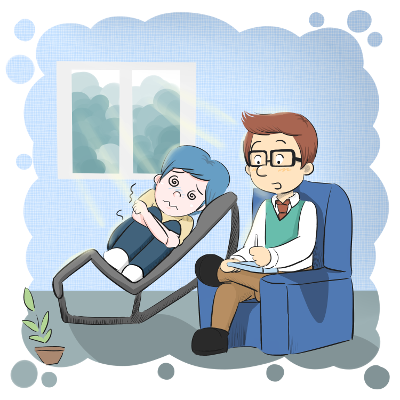Home > Mental care principles > #2 Therapies
#2 Therapies and Counseling
Part 1: Basic principles

Textbook definition of psychotherapy
According to the American Psychological Association (APA), "Psychotherapy is a collaborative treatment based on the relationship between an individual and a psychologist." [1] It is a type of treatment to control mental and behavioral problems through a series of conversations between a therapist and a patient. Conversations are structured differently based on the underlying theories informing them. Many theories exist, and so do therapists and therapies.
A promotional video by the APA illustrates how psychotherapies are intended to help people with mental health issues.
Efficacy of psychotherapy
Psychology theories are built on philosophical constructs; therefore, it is intrinsically difficult to compare and analyze how effective they are. In general, the efficacy depends on the patient's condition and level of effort, how the methods are administered, and the therapist's skill and experience.
In the U.S., the only mechanism to regulate the quality of therapy is by licensing. The exact licensing requirements vary by state.
It doesn't have to be a psychologist to perform psychotherapy. In California, for example, a person who is licensed by the Medical Board of California, California Board of Psychology, or California Board of Behavioral Sciences can practice psychotherapy. In addition, nurses, social workers, and interns who register and meet certain conditions can also perform psychotherapy or counseling within the state, according to California Code Section 1010. [2]
With the rapid expansion of therapy services available over the phone, Internet, or even a mobile app, you may see therapists outside of their state or country. Consumers should be aware of varying degrees of qualification and quality from people who call themselves "therapists."
Psychotherapies in principled mental care
Within the framework of principled mental care, psychotherapies are viewed as assisted self-help. Therapies work because of the collaboration between a motivated patient and a skilled therapist. The collaboration is a social mode of mental care, with a variety of additional modes depending on the specific therapy types utilized.
For example, in the case of creative arts therapies, the patient will engage in sensory and physical modes. In dialectical behavior therapy, the patient will go through spiritual, sensory, cognitive, and physical modes. If the therapy is performed by a psychiatrist, a biochemical mode (psychiatric medications) may be administered in conjunction with psychotherapy.
The efficacy of psychotherapies depends on the therapist's skill, the patient's effort, collaboration, and the use of the modes of mental care. Therapy can be considered successful and complete if the patient is able to continue the self help process without further supervision by the therapist.
[1] American Psychological Association. Retrieved on May 18, 2016. Link
[2] California Code Section 1010. Retrieved on May 17, 2016. Link
